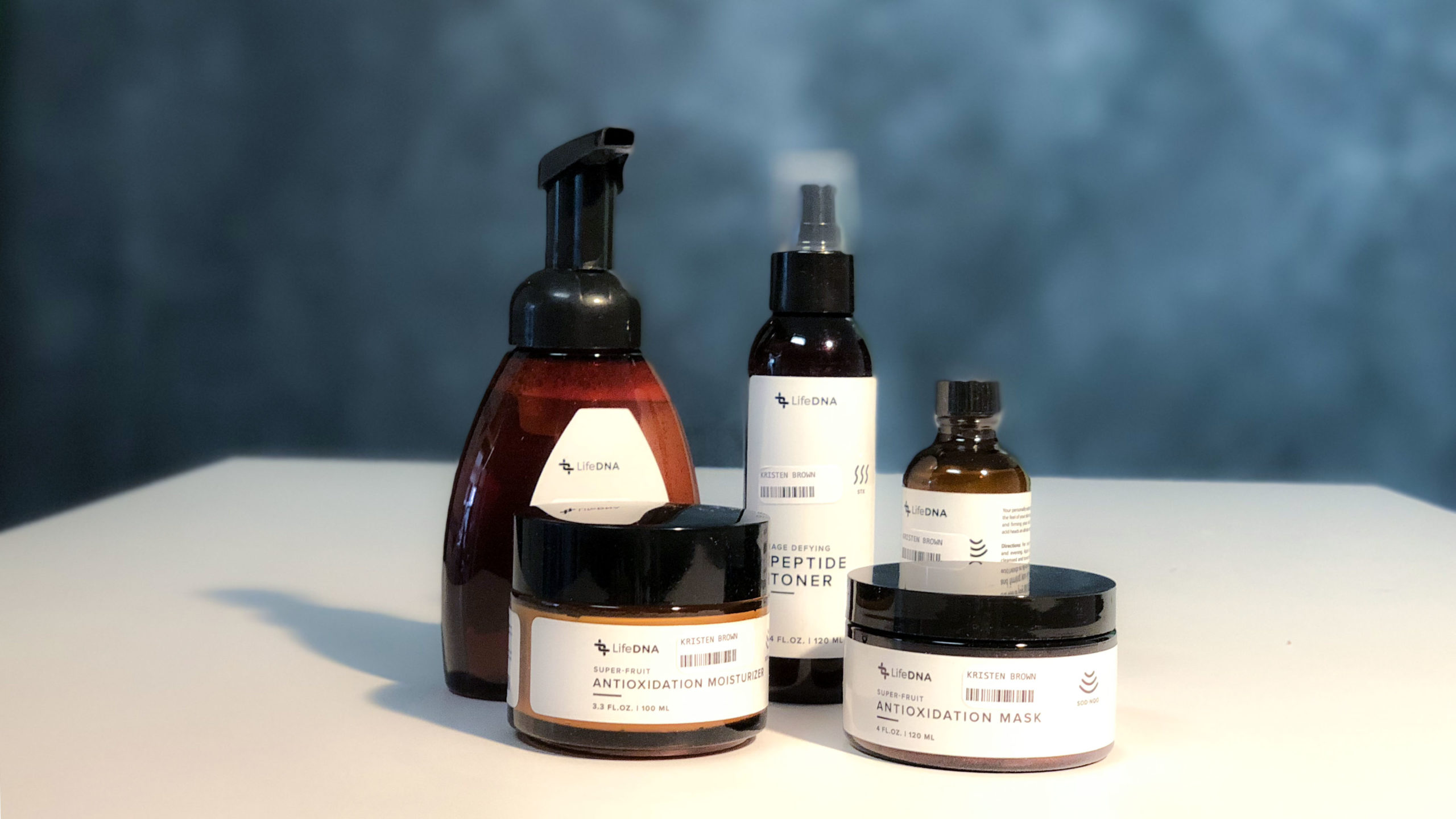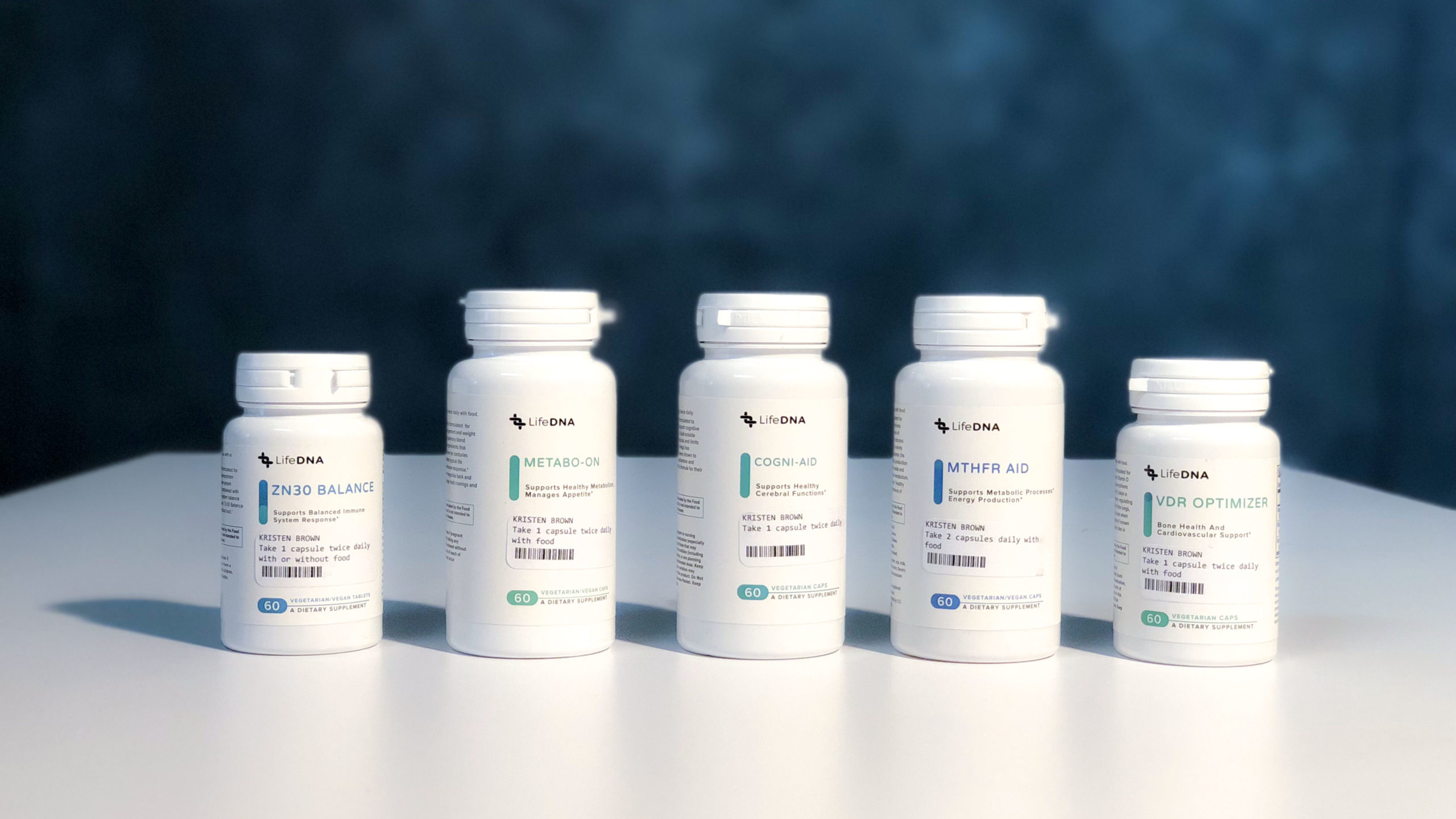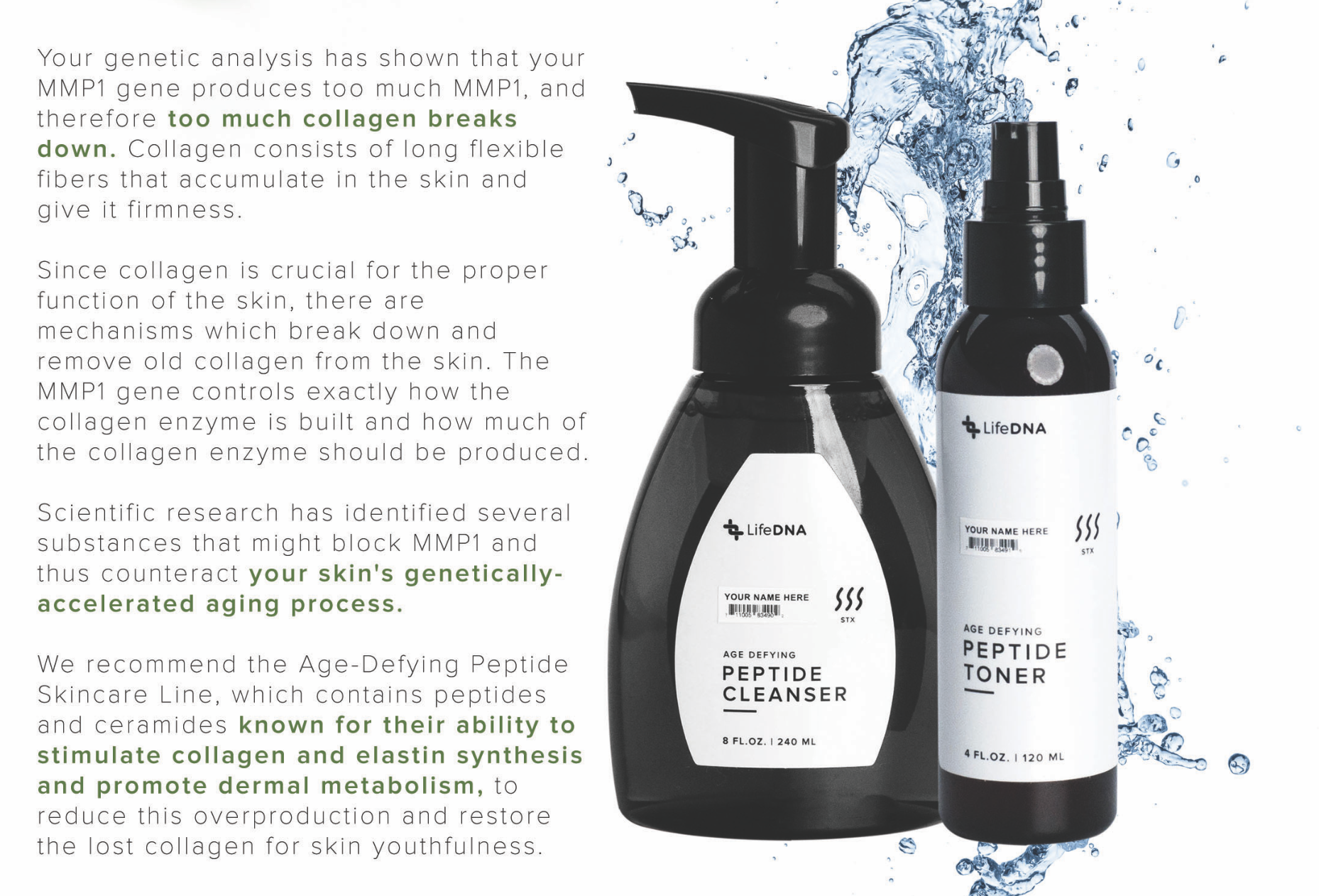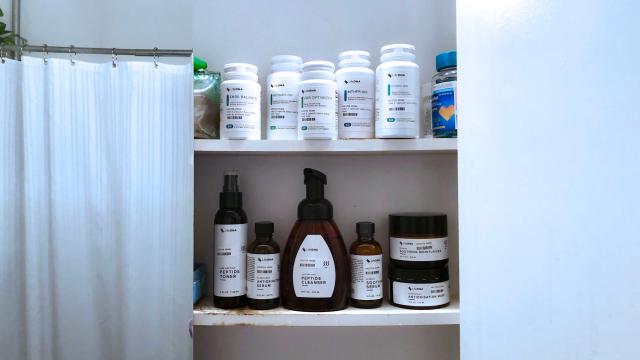The pitch was a skincare routine designed especially for me, genetically optimised to give me the skin I was “born to have.” The reality was decidedly more itchy, flaky, and red.
I may be a woman of science (or at least science journalism), but that has not always stopped me from falling pray to the bevy of skincare products out there that promise to prevent wrinkles, zap zits, or give my skin that Hollywood glow. My bathroom cabinet is full of mud masks, anti-ageing creams, and one $66 serum purchased in desperation the night before a big date. My head knows many such products are likely a scam, but the beauty-industrial complex has left me lusting enough for Instagram-filter perfection that I’m usually willing to give it a try anyway.
Still, when I was approached by the biotech startup LifeDNA asking if I’d be interested in giving their products a whirl, I was sceptical. LifeDNA purports to take your DNA data from companies like 23andMe, and, relying on findings from “over 1,100 peer-reviewed studies,” determine the best ingredients for you skin. Based on your DNA and answers to an online lifestyle questionnaire, the company ships you a box of its own branded skincare products. They aren’t cheap. The Deluxe Beauty Box will set you back $380 for a three-month supply of goods.
LifeDNA isn’t the only startup offering such products, nor is it the first. The idea itself is simple: Many traits, including those related to skin health, are influenced by our genes, so why not take into account what out genes say when deciding how to care for it? At this point, I have written so much about the trouble with oversimplifying the role that our genes play in our health and wellness that it’s become a refrain: This stuff is complicated, and we just don’t know that much about it. Certainly, I thought, not enough to justify $380 four times a year.
Then one day, I was walking down Market Street in San Francisco on the way to a meeting when a salesman standing outside of a luxury skincare shop lured me inside with the promise of free samples. He asked me about my moisturiser, then held a mirror up to my face and pressed me to examine under my eyes, where he said I was developing “fine lines.”
With those two words, the salesman had managed to completely obliterate my ego. My current two–step routine was a simple one that I felt good about until the “fine lines” comment. I seldom break out, and my skin is only occasionally dry, when the weather turns especially cold. But now I was horrified. I decided to give LifeDNA a try.
After I uploaded my 23andMe data to the company website, LifeDNA’s CEO, Cyril Moukarzel, sent me the Deluxe Beauty Box along with the $200 Dynamic Wellness Box, a one-month supply of nutritional supplements, also supposedly curated based on my DNA and lifestyle.
The boxes arrived. My first thought was, “Am I really going to put this much stuff on my face?”

Seriously, I am supposed to put all this on my face??Photo: Myra Iqbal (Gizmodo)
My Deluxe Beauty Box contained a cleanser, a toner, a moisturizer, and a serum that I was supposed to use twice a day, plus a weekly mask. The Dynamic Wellness Box included five daily supplements, which I was instructed to take twice a day. Even in the world of the 10-step Korean skincare routine, to me, a four-step skincare routine felt like a little much. The supplement regiment, though, seemed downright absurd.
The plan was to do a two-week trial to see how my skin compared before and after. On day one, I could tell it was going to be a long two weeks. Immediately after my first morning of cleansing and toning and moisturizing and seruming, my skin felt greasy, as if there was a thin layer of oil on top of it. It was also somewhat itchy.
I asked my grandmother, who often laments the number of medications she must take, what her daily pill count was. It was eight. Mine was now 10. It was hard to feel healthy swallowing more pills that my 87-year-old grandmother.

And also take all of these twice a day??Photo: Myra Iqbal (Gizmodo)
A few days in, the itchiness got worse. My skin felt flaky and was slightly red. I was on a first date with a cute guy and I found myself struggling to fight an urge to claw at my face. (Here’s hoping he didn’t notice.)
A week into my genetically optimised skincare experiment, I talked to Moukarzel, who was horrified.
“Unfortunately you had a pretty bad experience with this,” he told me. “That makes it harder to pitch it to you.” No kidding.
He thought it seemed likely that I was having an allergic reaction to the moisturizer, and instructed that I immediately stop using it. He also over-nighted me a replacement, this one, I guess, also optimised for my genetics. This new moisturiser didn’t include glycolic acid, a common skincare ingredient known for its excellent ability to penetrate and exfoliate the skin, but which can be irritating. His team thought I might be reacting to it. The new moisturizer smelled amazing, like a mango piña colada. I did not have an allergic reaction to it. But although my skin now smelled like a Hawaiian vacation, it was also not as hydrating as my usual moisturizer. I decided to tack an extra week onto the experiment to give the new moisturizer a full two-week try.
After the third week, my skin was no longer itchy and red. But it was dryer and seemed slightly more prone to pimples. The supplements seemed to have no discernable effect, other than to make me feel very irritated very early in the morning. Yuck.
I visited my dermatologist to ask him what he though about all this. He snarled and called it all a bunch of “hoopla.”
“It’s snake oil with a digital signature,” he said.
I needed to know what was going on.
“Every single person’s skin is different,” Moukarzel, whose background is in marketing, not science, told me. “When you’re buying generic skincare products, the company doesn’t know anything about you.”
Moukarzel told me that as a teen and young adult, he was plagued by acne. Products like the popular Proactive only made it worse. He now has scars and still struggled with breakouts into his adult years. Now he says he uses his company’s products and that they have finally improved his skin.
For me, on the other hand, LifeDNA’s products instead resulted in itchy, pimple-prone skin. If all this was really customised to DNA, my DNA and my face were not in very close communication about what kind of moisturizer to use.
My dermatologist told me that it would be virtually impossible to isolate what I was having an allergic reaction to, since the way different ingredients interact with each other is complex. Many skincare products, he told me, contain allergens and ingredients that react with one another to make them less effective. Usually, he told me, when it comes to the skin, it’s more important what you don’t put on it than what you do.
Moukarzel told me that my experience moved the company to add a section to their lifestyle questionnaire about allergies, but that wouldn’t have made any difference for me. My skin has never had an allergic reaction to any skincare product before.
Moukarzel said that company scientists “looks at thousands of studies” to determine which may be useful to customers, then an algorithm analyses a customer’s data to look for markers of “genetic weaknesses” based on those studies. Those traits are then matched with ingredients in skincare products and supplements that have been shown to prevent against them.
“We only analyse SNPs that have been studied intensively and repeatedly with a consistent result associating them with genetic weaknesses,” he told me.
For example, a brief analysis the company provided me of my skin showed that I had a variant of the gene MMP1 in which my body produces too much of the protein MMP1, causing collagen to break down. Collagen is the stuff that holds the body together, and it plays an important role in skin firmness. That’s why people inject it into their skin. Scientific research, the company said, had highlighted substances that might block MMP1 production and thus “counteract” my skin’s “genetically-accelerated ageing process.” So they prescribed me ingredients thought to stimulate collagen, among them peptides and ceramides.

The author’s skincare breakdown, provided by LifeDNA.Screenshot: LifeDNA
I consulted with Matthew Law, a researcher at the QIMR Berghofer Medical Research Institute who studies the role that genetics plays in skin ageing and cancer, to help me understand the science here.
LifeDNA cited two studies to back up the products they had sent me. One was a literature review, which mentioned vitamins A (aka retinol) and C as inhibitors of MMP1, but concluded only that exploring such topical treatments to slow the process of skin ageing was worthy of more research. The other was a study of just 10 people, that was in German, to boot. That study did mention ceramides, but ceramides, it turned out, were not an ingredient in any of my products. Neither study seemed to mention peptides prominently.
Law said that based on those two studies, recommending skincare products containing peptides and ceramides to fix my apparent MMP1 problem was a sizable leap. Neither study was clear-cut.
Moukarzel responded that the analysis I’d received was a draft, before they rolled out such analyses to customers.
“It didn’t include all of our studies nor did it include a breakdown of every single skincare product you received,” he said.
Still, I told him, I was confused about how the studies they did include backed up what I had received at all – and why anyone would ever rely on a 10-person study to make recommendations for the general populous in the first place.
Moukarzel sent me more studies, and noted that the ceramide recommendation based on the 10-person study had been removed from their recommendations after his scientists dug in “a little deeper” and “found that there’s no conclusive evidence” that it would work. The new studies he sent me were more convincing, but still many of them were small and inconclusive. Not to mention that peptides are simply short chains of amino acid monomers linked by amide bonds. There are lots of classes of peptides. Which are effective to treat collagen breakdown? Which did these products use? Does anyone even know? I was extremely credulous. I’m pretty sure I got a few more “fine lines” just trying to figure all this out.
The field of skincare genetics, Law told me, is still in its early days, and most of what has been discovered so far has to do with skin pigmentation.
“It’s much harder to make measurements of something like say, skin ageing, than asking people whether they have diabetes or cardiovascular disease,” Law said. “Research into skin genetics is much more early days than other complex traits.”
There are hundreds of genetic variants that impact skin colour alone. Skin, as Law said, is indeed a complicated trait. While it’s true that MMP1 cleaves collagen as a response to inflammation, among other things, it’s possible that other pathways could mediate an over-expression of it. The environment also plays a major role. To quote one of the studies cited by LifeDNA: “Skin ageing is a complex biological process influenced by a combination of endogenous or intrinsic and exogenous or extrinsic factors.”
Eventually, Law said, the field will hopefully discover molecular pathways that can be used to develop treatments for both the medical and the cosmetic realms. But because our environment, with its fluctuating levels of humidity, pollution, UV exposure, and other variables, plays such a huge role in skin health, it’s unlikely that any skincare product could ever really be determined based on genetics alone. (This, Moukarzel noted, is why the company also has customers fill out a lifestyle survey.)
“The only actionable information we have at the moment is that wearing sunscreen makes a big difference,” said Law. “If you want my advice, wear a hat.”
As it turns out, I might know my own skin better than an algorithm trying to decipher the many mysteries of my DNA. I’ve decided to go back to my two-product routine – but now I’m looking for a good sunscreen.
